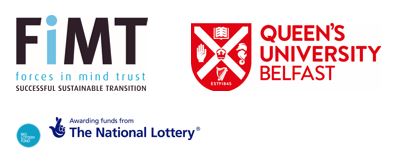Forces in Mind Trust (FiMT) has awarded £179,848 to Queen’s University Belfast to conduct a three-year, UK-wide study of the experiences of ex-Service personnel who have had an adverse transition back into civilian life.
The research will cover all four nations of the UK, and will look specifically at those who have ended up homeless, in prison or under mental health supervision.
The project aims to build on current knowledge regarding ‘pathways to failure’, and will do this through undertaking qualitative research to include two case studies of voluntary sector support provision, one in Birmingham, the other in Glasgow, as well as conducting interviews with ex-Service personnel, support staff, and with family members of those who have experienced a ‘negative transition’.
As the focus will be on the lived experiences of those interviewed, this will identify potential differences in experiences, such as between regular and reserve forces, male and female ex-Service personnel, and early Service leavers compared to longer-term personnel. Geographical location will also be taken into consideration, looking at broader social and cultural factors and how these influence attitudes and responses.
Evidence will be gathered through qualitative research with a large sample of 250, comprising interviews with 150 ex-Service personnel and approximately 50 adult family members, as well as two ethnographic case studies. The research will identify key factors that impact on negative transitioning, contributing to the body of knowledge that exists on those who struggle to transition successfully.
Ray Lock, Chief Executive of Forces in Mind Trust said: “Forces in Mind Trust was created to ensure that ex-Service personnel have a successful and sustainable transition to civilian life. Of course, the definition of successful lies very much in the eyes of the beholder, and therefore failed (or adverse, or negative) transition is a subjective and highly contextual judgment. But demonstrably some are relatively easy to define, although our understanding of how an ex-Service person reaches this point is scant.
“By funding this Queen’s University Belfast project, and presenting the findings to service providers and policy makers, we will improve the transition pathway for the most vulnerable. By hearing directly from ex-Service personnel and their families, those who work in such supporting areas will be able to prevent the same difficulties happening to others.”
Professor John Brewer, from the Senator George J. Mitchell Institute at Queen’s and the Principal Investigator on the project, said: “I am looking forward to working with Forces and Mind Trust and am grateful that they acknowledged the importance of research that explores the life experiences of those ex-Service personnel who were transitioning very negatively back to civilian life.
“It is time we understood the factors that lie behind homelessness, mental ill-health and the prison experience of former Service men and women from their own perspective and in their own words.”
-ENDS-
Note to Editor: Ray Lock and Professor John Brewer are available for interview. To arrange please contact Tina McKay, Communications Officer at FiMT on co@fim-trust.org or on 07956 101132 or 0207 901 8916.
About the Forces in Mind Trust (FiMT):
FiMT came about from a partnership between the Big Lottery Fund (‘the Fund’), Cobseo (The Confederation of Service Charities) and other charities and organisations. FiMT continues the Fund’s long-standing legacy of support for veterans across the UK with an endowment of £35 million awarded in 2012. http://www.biglotteryfund.org.uk/.
The mission of FiMT is to enable ex-Service personnel and their families make a successful and sustainable transition to civilian life, and it delivers this mission by generating an evidence base that influences and underpins policy making and service delivery.
FiMT awards grants (for both responsive and commissioned work) to support its change model around 6 outcomes in the following areas: Housing; Employment; Health and wellbeing; Finance; Criminal Justice System; and Relationships. All work is published in open access and hosted on the Forces in Mind Trust Research Centre’s Veterans and Families Research Hub. A high standard of reportage is demanded of all grant holders so as to provide a credible evidence base from which better informed decisions can be made.
Useful links
Website: www.fim-trust.org
Reports: www.fim-trust.org/reports/
Who we have helped: www.fim-trust.org/who-we-have-helped/
Twitter: @FiMTrust
About the Mental Health Research Programme: www.fim-trust.org/mental-health/research-programme/
Queen’s University Belfast is ranked in the top one per cent of universities in the world (QS World Rankings 2018 / webometrics.info) and is part of the Russell Group of universities, combining excellence in research and education with a student-centred ethos. Queen’s is ranked 8th in the UK for Research Intensity with over 75% of its research assessed as ‘world-leading’ or ‘internationally excellent’ in REF 2014, and is one of the UK’s leading institutions for research commercialisation.

















